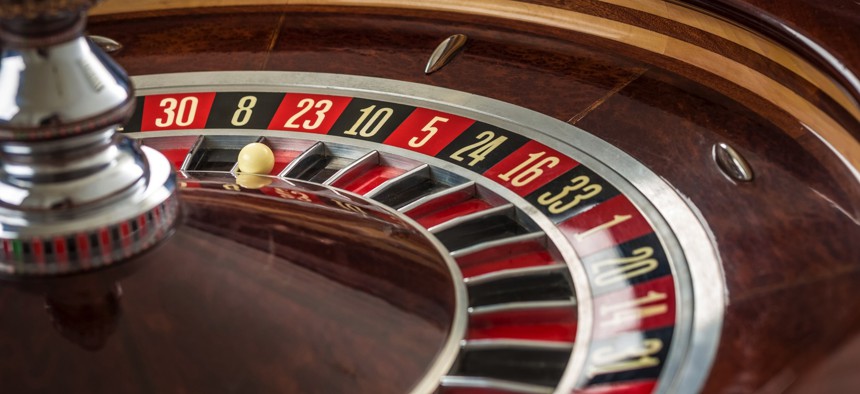Casino Job Growth in Pennsylvania Falls Short of Industry-Backed Estimates

nazarovsergey / Shutterstock.com
“This is a lesson for the General Assembly to more cautiously review job creation projections and estimates,” says Auditor General Eugene DePasquale.
Allowing table games like poker, roulette and blackjack in Pennsylvania casinos has not led to the jackpot of jobs described in a study commissioned by gambling industry interests, according to a report the state’s auditor general released Wednesday.
The industry-backed study was completed about seven years ago and factored into a legislative debate in Pennsylvania’s General Assembly about whether to relax state gaming laws so that gambling venues could operate table games. Although the study’s authors predicted the games would generate 10,100 direct jobs, that number was actually 6,156 as of June 1, 2015, according to the report from Auditor General Eugene DePasquale’s office.
“While the number of jobs realized from table games is less than expected, 6,000 new jobs and people working is a good thing,” DePasquale said in a statement Wednesday. “This is a lesson for the General Assembly to more cautiously review job creation projections and estimates related to any legislation under consideration in the future.”
State legislation enacted in 2010 allows for table games at Pennsylvania’s 12 licensed casinos. Prior to that time, slot machines had been permitted at state-licensed facilities. During the debate that preceded the passage of the table game legislation, its backers made the case that permitting the games in Pennsylvania would increase tax revenue and spur job growth.
Slot machine operators put forward various estimates of how much new employment the games would spark, according to the auditor general’s report.
In 2009, gaming industry companies with interests in the state hired a consulting firm, The Innovation Group, to produce the study that contained the overly optimistic job estimates. Dubbed a “technical memorandum,” its results were submitted in June of that year to the House Gaming Oversight Committee in the General Assembly.
The memorandum’s authors, the auditor general’s report says, told members of the Gaming Oversight Committee at a hearing that, based on the economic models used in the study, the introduction of table games in Pennsylvania was expected to yield not only 10,100 direct jobs, but also an additional 6,266 positions created from “induced or indirect” spending.
As the table gaming legislation advanced, the casino industry’s study “became the de facto standard for job creation estimates” and references were made during Senate committee meetings, and in the House, to the expectation of “16,000 jobs being created,” the auditor general’s report notes.
Two assumptions the study’s authors relied on did not pan out. One was that tax rates on casinos in Pennsylvania would be 12 percent. Table game revenues are taxed at 14 percent for the first two years of a casino’s operations, then at 12 percent after that. The study also did not take into account limits that were included in state law on the number of table games.
The idea that casino expansions can be a boon for job growth has featured prominently during policy debates in other states as well. This was the case in New York, where four recently greenlighted casino projects are now in the works.
DePasquale’s office reviewed the table game job numbers as part of a performance audit report released on Wednesday, which examined the Pennsylvania Gaming Control Board. The board oversees the enforcement of gaming laws, regulations and licensing in the state.
In addition to the jobs figures, the auditor general’s report delved into a number of other topics related to the board.
One was the apparent lack of applicants for nearly $8 million of casino revenue, which had been earmarked in 2014 for grants to help local law enforcement agencies fight illegal gambling.
Another issue was that the Gaming Control Board’s seven board members have been able to claim “enhanced” daily food reimbursements when traveling.
These have been up to two-and-a-half times higher than reimbursements afforded to the board’s staff. According to the report, a board member traveling to Pittsburgh on business would be eligible for a daily meal allowance of $177.50.
On Wednesday, the Gaming Control Board issued monthly figures that show overall casino revenues from table games in January were $71,093,205, up from $66,023,942 during the same month last year. State taxes on table game play last month totaled $10,097,868, the figures also show. In January, an average of 1,167 tables were operated daily statewide.
Bill Lucia is a Reporter for Government Executive’s Route Fifty.
NEXT STORY: Data Reveal Progress on Online Voter Registration in These States






